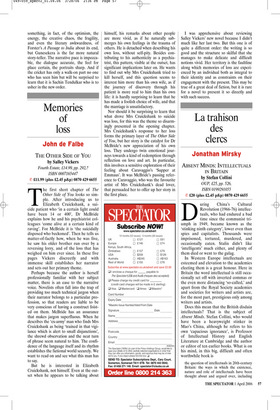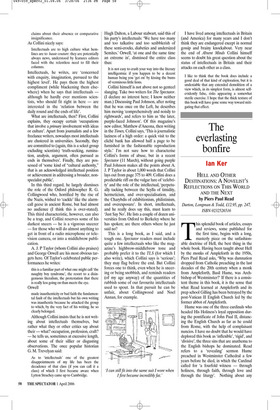La trahison des clercs
Jonathan Mirsky
ABSENT MINDS: INTELLECTUALS IN BRITAIN by Stefan Collini OUP, £25, pp. 526, ISBN 0199291055 V £20 (plus £2.45 p&p) 0870 429 6655 During China’s Cultural Revolution (1966-76) intellectuals, who had endured a bad time since the communist triumph in 1949, became known as the ‘stinking ninth category’, lower even than spies and capitalists. Thousands were imprisoned, tortured, murdered, and occasionally eaten. Stalin didn’t like ‘intelligents’ much either, and plenty of them died or went to the gulag.
In Western Europe intellectuals are esteemed and elevation to the academies electing them is a great honour. Here in Britain the word intellectual is still occasionally set off with inverted commas or the even more distancing ‘so-called,’ and apart from the Royal Society academies and societies for writers and artists are, for the most part, prestigious only among writers and artists.
Does this mean that the British disdain intellectuals? That is the subject of Absent Minds. Stefan Collini, who would have been a heavyweight stinker in Mao’s China, although he refers to his own ‘capacious ignorance’, is Professor of Intellectual History and English Literature at Cambridge and the author or editor of ten earlier books. What is on his mind, in this big, difficult and often worthwhile book is
the question of intellectuals in 20th-century Britain: the ways in which the existence, nature and role of intellectuals have been thought about and argued over, including claims about their absence or comparative insignificance.
As Collini nicely says: Intellectuals are to high culture what hemlines are to haute couture: they are potentially always news, understood by features editors faced with the relentless need to fill their columns.
Intellectuals, he writes, are ‘concerned with enquiry, imagination, pursued to the highest level’. He pays them the highest compliment (while blackening them elsewhere) when he says that intellectuals although he hardly ever mentions scientists, who should fit right in here — are interested in the ‘relation between the daily round and the ends of life’.
What are intellectuals, then? First, Collini explains, they occupy certain ‘occupations that involve a primary involvement with ideas or culture’. Apart from journalists and a few freelance writers, nowadays most intellectuals are clustered in universities. Secondly, they are committed to (again, this is a select group excluding scientists) ‘truth-seeking, rumination, analysis, argument, often pursued as ends in themselves’. Finally, they are possessed of ‘some kind of “cultural authority,” that is an acknowledged intellectual position or achievement in addressing a broader, nonspecialist public’.
In this third regard, he largely dismisses the role of the Oxford philosopher R. G. Collingwood who, horrified by the rise of the Nazis, wished to ‘cackle’ like the alarmcall geese in ancient Rome, but had almost no audience (I think this is over-stated). This third characteristic, however, can also be a trap, and Collini reserves some of his darkest sneers — he is a vigorous sneerer — for those who will do almost anything to get in front of a radio microphone or television camera, or into a middlebrow publication.
A. J. P Taylor (whom Collini also praises) and George Orwell are his most obvious targets here. Of Taylor’s celebrated public performances he writes:
this is a familiar part of what one might call ‘the naughty boy syndrome’, the resort to a disingenuous literalism, the protestation that there is really less going on than meets the eye.
Orwell
made inauthenticity or bad faith the fundamental fault of the intellectuals but his own writing was inauthentic because he attacked the group to which, by the very fact of his writing, he so clearly belonged.
Although Collini insists that he is not writing about intellectuals themselves, but rather what they or other critics say about their — what? occupation, profession, craft? — he tells us, sometimes at excessive length, about some of their sillier or disgusting observations. The once popular historian G. M. Trevelyan said:
As to ‘intellectuals’ one of the greatest disappointments of my life has been the decadence of that class (if you can call it a class) of which I first became aware when Lytton Strachey came up to Cambridge.
Hugh Dalton, a Labour stalwart, said this of his party’s intellectuals: ‘We have too many and too talkative and too scribblerish of these semi-crocks, diabetics and undersized Semites.’ Orwell, ‘at one and the same time an extreme in’, dismissed the entire class thus:
It is not easy to crash your way into the literary intelligentsia: if you happen to be a decent human being you ‘get on’ by kissing the bums of verminous little lions.
Collini himself is not above not so genteel slanging. Take two writers for The Spectator. (I declare no interest here; I know neither man.) Discussing Paul Johnson, after noting that he was once on the Left, he describes him moving ‘comprehensively and noisily to rightwards’, and refers to him as ‘the later, purple-faced Johnson’. Of this magazine’s new editor, Matthew d’Ancona, then writing in the Times, Collini says, ‘This is journalistic laziness of a high order: a quick visit to the cliché bank has allowed half a page to be furnished in the fashionable reproduction style.’ I’m not sure how to characterise Collini’s forms of abuse, but in a recent Spectator (11 March), without going purple Paul Johnson makes all the points about A. J. P Taylor in about 1,000 words that Collini lays out from page 375 to 409. Collini does a predictable riff on the vulgar lure of ‘celebrity’ and the role of the intellectual, ‘perpetually tacking between the Scylla of timidity, hermeticism, and over-specialisation, and the Charybdis of exhibitionism, philistinism, and overexposure’. In short, intellectuals, and he really does say this, must learn to ‘Just Say No’. He lists a couple of dozen universities from Oxford to Berkeley where he has spoken; are there others where he just said no?
This is a long book, as I said, and a tough one. Spectator readers must include quite a few intellectuals who like the magazine’s highbrow-middlebrow tone and probably prefer it to the TLS (for which I also write), which Collini says is ‘serious’; they may flag before the end. But Collini forces one to think, even when he is sneering or being snobbish, and reminds readers (of my age anyway) of the quantities of rubbish some of our favourite intellectuals used to spout. In that pursuit he can be unfair, about Collingwood and Noel Annan, for example. I have lived among intellectuals in Britain (and America) for many years and I don’t think they are endangered except in normal gossip and brainy knockabout. Very near the end of Absent Minds Collini himself seems to doubt his great question about the status of intellectuals in Britain and their attacks on each other as a class.
I like to think that the book does include a good deal of that kind of exploration, but it is undeniable that any extended demolition of a view which, in its simplest form, is almost selfevidently false, risks appearing a somewhat sterile exercise. I hope that the thick texture of this book will have gone some way toward mitigating that effect.



























































































 Previous page
Previous page